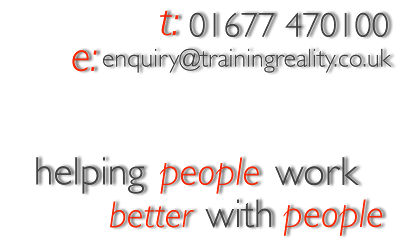Please press (at least!) one of these.
It costs you nothing, and (possibly) helps us spread the word!
Corporate conformity...
Friday, 5 March 2010
Being different can be challenging. Being different can unnerve, upset, irritate and anger others. Being different can be the best thing you’ll ever be. Because you are.
This is an article of three halves (sic!). This half is going to look at the problems that conformity can cause in organisations, and the second half, to be published soon, will look at the opposite: non-conformity. Finally, in the third half, we'll hit the sweet spot.
Many of us will have come across conformity in our lives. It begins for many at school, where there is the desire to fit in, and can continue throughout adult working and social lives. Unfortunately, there are some real risks associated with it. This is by no means an exhaustive list:
Group think
Just take a moment, and see how many examples you can think of in each of the following categories:
- Failed product launches
- Marketing campaigns gone wrong
- Political ideas that crash and burn
- Detailed plans that go awry
My guess would be that in many of these instances, corporate or organisational "group think" is in operation. Most teams, businesses and companies value enthusiasm; value those who get behind big ideas; value and reward people who take the lead and make things happen. Rightly so: those are all wonderful things.
It appears to be harder – or at least less common – to value and reward the few individuals who question the group think. The people who challenge others and ask the difficult questions. And yet those can be just the people who are needed to help organisations avoid potentially catastrophic failures.
Inauthenticity
A second concern about conformity is that it can lead to inauthenticity. Organisations, brands, businesses: they all can have, and can benefit from, a consistent expression of their image; but to what extent does this demand conformity from employees?
In the long-term, can the right people, who you really want in your organisation, sustain a pretence of being something that they are not? There is a balance to strike between conformity and freedom to be oneself (see here for more on this topic)
Sub-optimal performance
At the risk of banging on about one of my favourite topics and favourite philosophers, how can an organisation benefit from the enormous rewards delivered by using Socratic dialogue if everyone conforms to the corporate norm? In essence, Socratic dialogue:
is a form of inquiry and debate between individuals with opposing viewpoints based on asking and answering questions to stimulate rational thinking and to illuminate ideas
…and what rational organisation could possibly want to prevent this?
Rigidity
As a final example of the issues that can be caused by conformity in organisations, I want to mention rigidity.
Times change. Environments change. Circumstances change. In order to cope with this, organisations, and therefore the people within those organisations, need to change too. If conformity is too great, if thinking becomes inflexible, and if approaches, styles and behaviours become rigid, the organisation will not be able to change, quickly enough, to cope, let alone reap the rewards of change.
--
So, if conformity can be such a dangerous thing, how about a non-conformist approach? The next article in this series will dip into that pool of stormy water…
Please press (at least!) one of these.
It costs you nothing, and (possibly) helps us spread the word!



